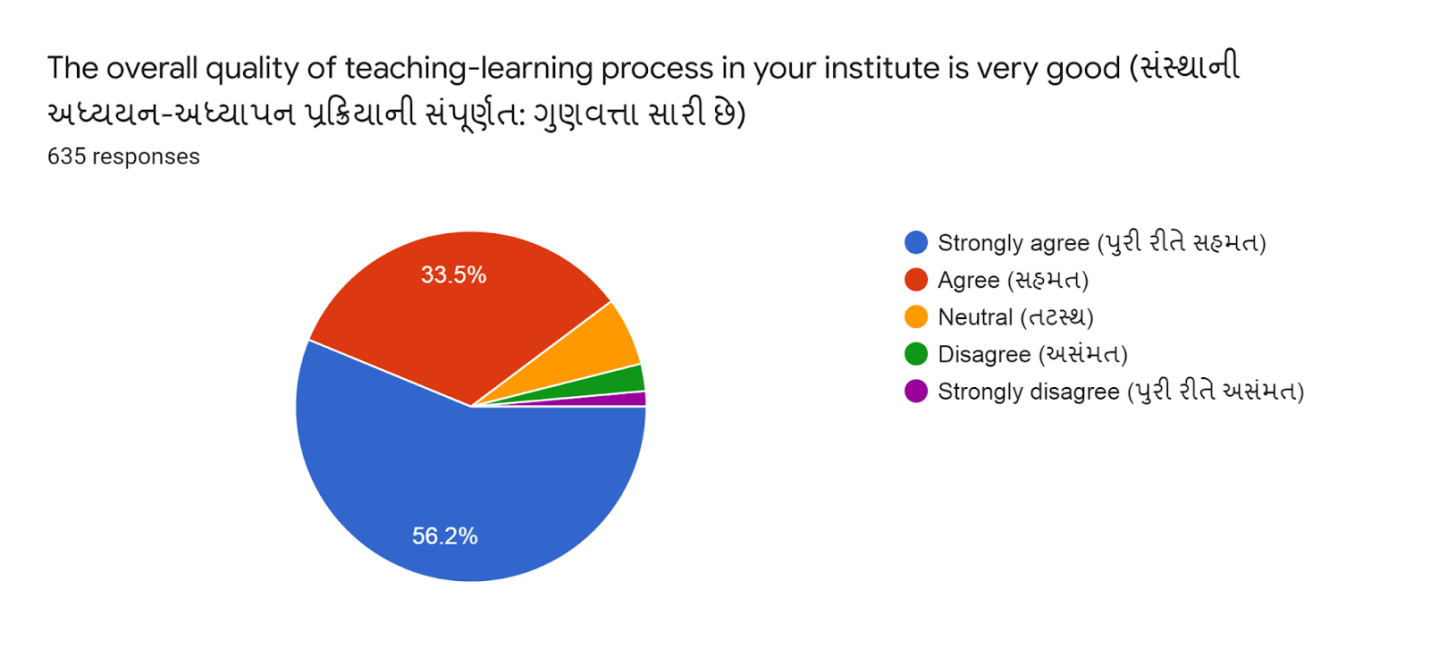Student Satisfaction Survey
Importance of Student Satisfaction Survey (SSS):
NAAC (National Assessment and Accreditation Council) is conducting a Student Satisfaction Survey regarding Teaching – Learning and Evaluation, which will help to assess the quality status of the institution The identification of the respondent will not be revealed. From 2017 onwards the NAAC (National Assessment and Accreditation Council) has endeavoured to conduct a Student Experience Survey the results of which will go into the accreditation process. The Survey will capture student responses through the list of students provided by the Higher education institutes (HEIs). There are twenty objective questions in the questionnaire and one open ended question. Analysis of the open-ended question: The students are asked to give three observations/suggestions to improve the overall teaching-- learning experience in the institution.
The survey measures how satisfied the students are with their experience providing a measurable benchmark on areas such as coursework, facilities, access to academic resources, the quality and availability of extra-curricular activities etc. Student satisfaction influences not only how much students enjoy their time at a college or a university, but also how well they do. Their grades, course participation, relationships with lecturers, attendance, employability etc. rely upon how much they enjoyed their time at a college or a university and how engaged they were. Student Satisfaction Survey is vital for promoting life at the institution.
Aim of SSS:
The survey aims to gather information on students, including their employment situation, their reasons for undertaking the training, the relevance of their training to their employment, any further study aspirations, reasons for not undertaking further training and satisfaction with their training experience.
Objective of the survey:
To find out the satisfactory level of male and female students with respect to Teaching – Learning and Evaluation
Impact of SSS:
A new study in the Journal of Business Research, found that student satisfaction has a dramatic impact on the perceived identity of an institution, and therefore a direct effect on the success of student recruitment efforts.
Methodology followed:
The following methodology is followed in collection of data from the students with respect to student satisfactory survey.
- A reliable questionnaire is developed and put in the Google form to collect the responses from the students through on-line.
- A link is developed and put in the one of the social media i. e. Telegram.
- All the students are informed to fill in the Google Form containing 20 questions pertaining to SSS.
- The procedure of filling the questionnaire is explained by the faculties in detail in advance.
- The responses are collected and analyzed properly by the experts i. e. the techno-savvy.
- All the responses are collected in excel sheet and then the graphical representations and interpretations of the data are made.
- A detailed report is prepared and key recommendations are suggested.
The list of 20 questions is as follows:
| Student Satisfaction Survey | |
| 1 | How much of the syllabus was covered in the class? 4 – 85 to 100% 3 – 70 to 84% 2 – 55 to 69% 1– 30 to 54% 0 –Below 30% |
| 2 | How well did the teachers prepare for the classes? 4 –Thoroughly 3 – Satisfactorily 2 – Poorly 1 – Indifferently 0 – Won’t teach at all |
| 3 | How well were the teachers able to communicate? 4 – Always effective 3 – Sometimes effective 2 – Just satisfactorily 1– Generally ineffective 0– Very poor communication |
| 4 | The teacher’s approach to teaching can best be described as 4 – Excellent 3 – Very good 2 – Good 1 – Fair 0 – Poor |
| 5 | Fairness of the internal evaluation process by the teachers. 4 – Always fair 3 – Usually fair 2 – Sometimes unfair 1 – Usually unfair 0– Unfair |
| 6 | Was your performance in assignments discussed with you? 4 – Every time 3 – Usually 2 – Occasionally/Sometimes 1 – Rarely 0– Never |
| 7 | The institute takes active interest in promoting internship, student exchange, and field visit opportunities for students. 4 – Regularly 3 – Often 2 – Sometimes 1 – Rarely 0– Never |
| 8 | The teaching and mentoring process in your institution facilitates you in cognitive, social and emotional growth. 4 – Significantly 3 – Very well 2 – Moderately 1 – Marginally 0– Not at all |
| 9 | The institution provides multiple opportunities to learn and grow. 4 – Strongly agree 3 – Agree 2 – Neutral 1 – Disagree 0– Strongly disagree |
| 10 | Teachers inform you about your expected competencies, course outcomes and programme outcomes. 4 – Every time 3 – Usually 2 – Occasionally/Sometimes 1 – Rarely 0– Never |
| 11 | Your mentor does a necessary follow-up with an assigned task to you. 4 – Every time 3 – Usually 2 – Occasionally/Sometimes 1 – Rarely 0 – I don’t have a mentor. |
| 12 | The teachers illustrate the concepts through examples and applications. 4 – Every time 3 – Usually 2 – Occasionally/Sometimes 1 – Rarely 0– Never |
| 13 | The teachers identify your strengths and encourage you with providing right level of challenges. 4 – Fully 3 – Reasonably 2 – Partially 1 – Slightly 0– Unable to |
| 14 | Teachers are able to identify your weaknesses and help you to overcome them. 4 – Every time 3 – Usually 2 – Occasionally/Sometimes 1 – Rarely 0– Never |
| 15 | The institution makes effort to engage students in the monitoring, review and continuous quality improvement of the teaching learning process. 4 – Strongly agree 3 – Agree 2 – Neutral 1 – Disagree 0 – Strongly disagree |
| 16 | The institute/teachers use student centric methods, such as experiential learning, anticipative learning and problem solving methodologies for enhancing learning experiences. 4 – To a great extent 3 – Moderate 2 – Some what 1 – Very little 0 – Not at all |
| 17 | Teachers encourage you to participate in extracurricular activities. 4 – Strongly agree 3 – Agree 2 – Neutral 1 – Disagree 0 – Strongly disagree |
| 18 | Efforts are made by the institute/teachers to inculcate soft skills, life skills and employability skills to make you ready for the world of work. 4 – To a great extent 3 – Moderate 2 – Some what 1 – Very little 0 – Not at all |
| 19 | What percentage of teachers use ICT tools such as LCD projector, Multimedia, etc. while teaching. 4 – Above 90% 3 – 70 – 89% 2 – 50 – 69% 1 – 30 – 49% 0 – Below 29% |
| 20 | The overall quality of teaching-learning process in your institute is very good. 4 –Strongly agree 3 – Agree 2 – Neutral 1 – Disagree 0 – Strongly disagree |
| 21 | Give three observation or suggestions to improve the overall teaching – learning experience in your institution. a) b) c) |
ANALYSIS OF STUDENT SATISFACTION SURVEY (SSS)
Keeping in view the above-mentioned questionnaire e conducted a survey recently and the analysis of the survey is as under:
1. Ours is a co-education college. We collected responses from both the genders. Out of 634, 56.8% girls and 43.2% boys have taken part in the SSS.

2. According to the policy of Gujarat Government, we have to reserve the stipulated seats for the reserved category students. So category wise analysis is mandatory for the SSS.

3. Ours is a reputed college well-known for its quality education. Therefore, students from various states of India also seek admission in our college. Our college is located in the North Gujarat region and so most of the students hail from North Gujarat.

4. We offer two kinds of programmes to the students seeking admission in our college. B. Com. & M. Com. The students belonging to both the programmes (B. Com. Sem. 2, 4, 6 & M. Com. 2,4) have participated in the SSS.

5. This survey includes the students from B. Com. Sem. 1 to B. Com. Sem. 6 and M. Com. Sem. 1 to M. Com. Sem. 4. They joined this college in different years i. e. from the year 2016 to 2022.

6. Within the stipulated time span the teachers try to cover all the topics prescribed in the syllabus for detailed study by the university and they also try to do justice to the units devoted to them. Most of the students i. e. 80% to 100% have responded positively.

7. The respondents are of the opinion that more than 97% teachers make proper prior planning and preparation of their subjects before engaging their classes.

8. 87% students have responded that their teachers are good at communication skills and they can understand everything taught by their teachers very easily.

9. Majority of the students (82%) believe that the teachers’ approach to teaching is worth-appreciative. The teachers make the students take keen interest in the subjects offered by them. The teachers are amiable and amicable.

10. Most of the students (95%) have given the response positively because transparency in the internal evaluation is given top most priority. During the Covid 19 pandemic the college conducted all exams online and the results were declared online as well very speedily.

11. After completion of the syllabus the teachers assign questions to the students from the topics taught by them for extensive learning at home. 86% students are of the opinion that the questions of the term papers are discussed in the classrooms.

12. A great number of students (76%) have responded they are provided opportunities to be a part of Student Exchange Programs and field visits. These activities are performed at regular intervals. But all these activities are not performed at the cost of teaching learning process.

13. Most of the students (85%) believe that the teaching and mentoring process of the college play a pivotal role in their mental, social and emotional growth and development. It is a fact that the college is interested in exploring the potentiality of the students which can pave the way for their overall development.

14. 88% students are of the opinion that ample opportunities are provided to them for their growth. The credit goes to college because it makes an arrangement for activities such as competitive classes, seminars, conferences and workshops on different subjects. This kind of participative management leads to their mental, emotional, social and spiritual growth.

15. Most of the responses (88%) indicate that the teachers are instrumental in exploring their hidden potentialities. The students are informed by the teachers that they are good at these particular fields. They are highly motivated by the teachers.

16. A great number of students (98%) have informed that the teachers keep themselves in constant touch with the students and the teachers go on making inquiry related to the tasks assigned to them very frequently.
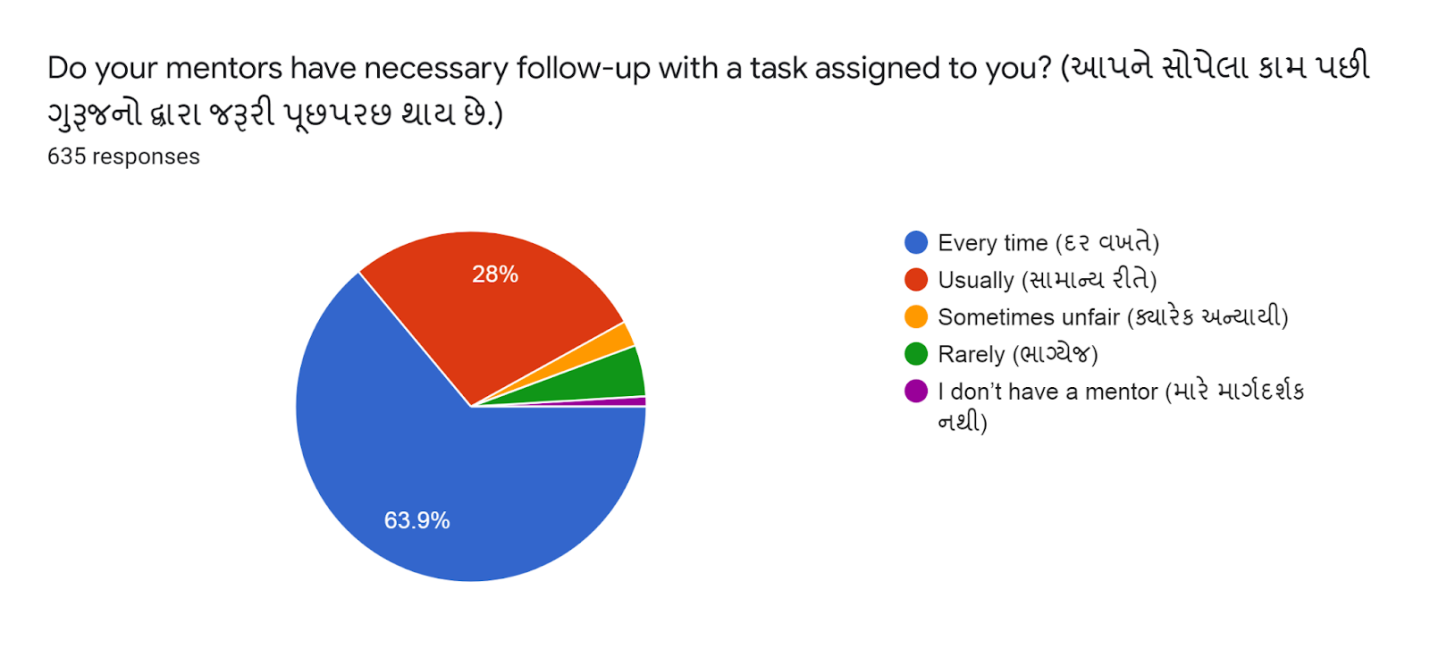
17. 91% students have responded that the teaching learning process is made interactive, innovative and interesting by the teachers illustrating the concepts through examples and applications. Most of the topics are taught using PPTs.
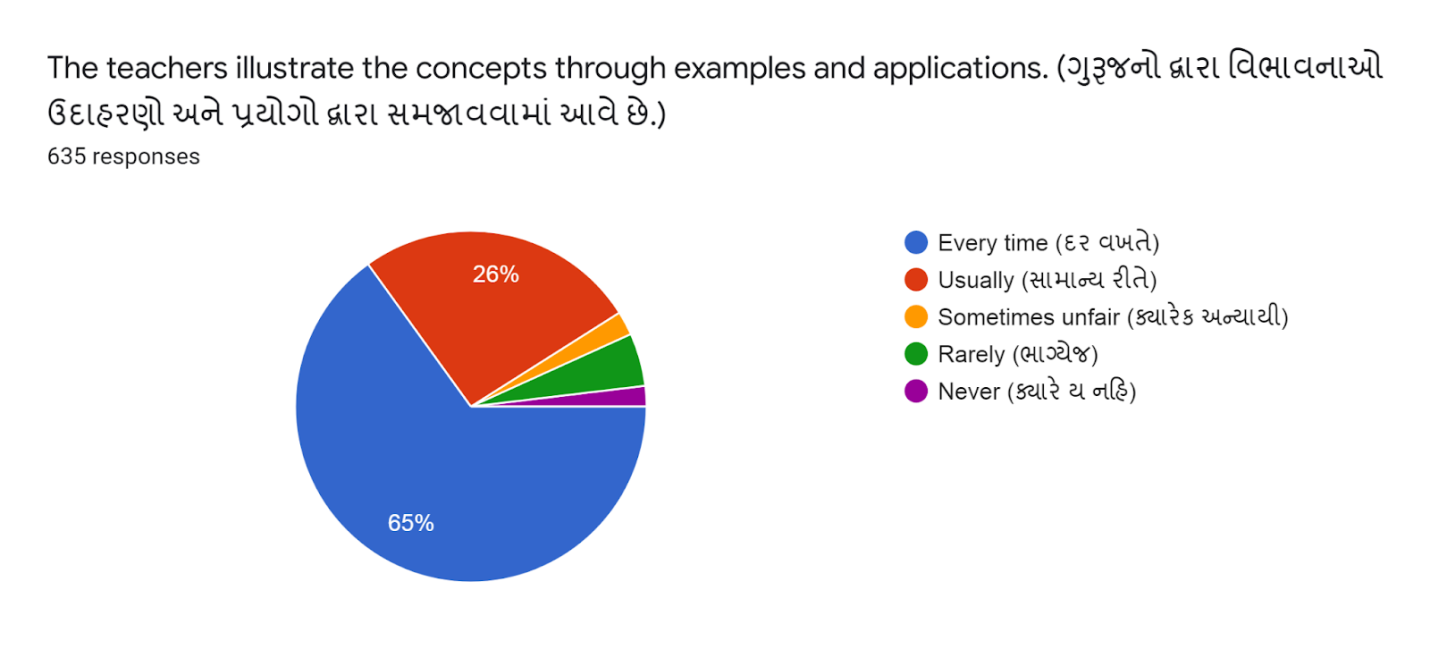
18. Majority (90%) believe that their hidden capabilities are explored by their teachers by identifying their strengths on different occasions.
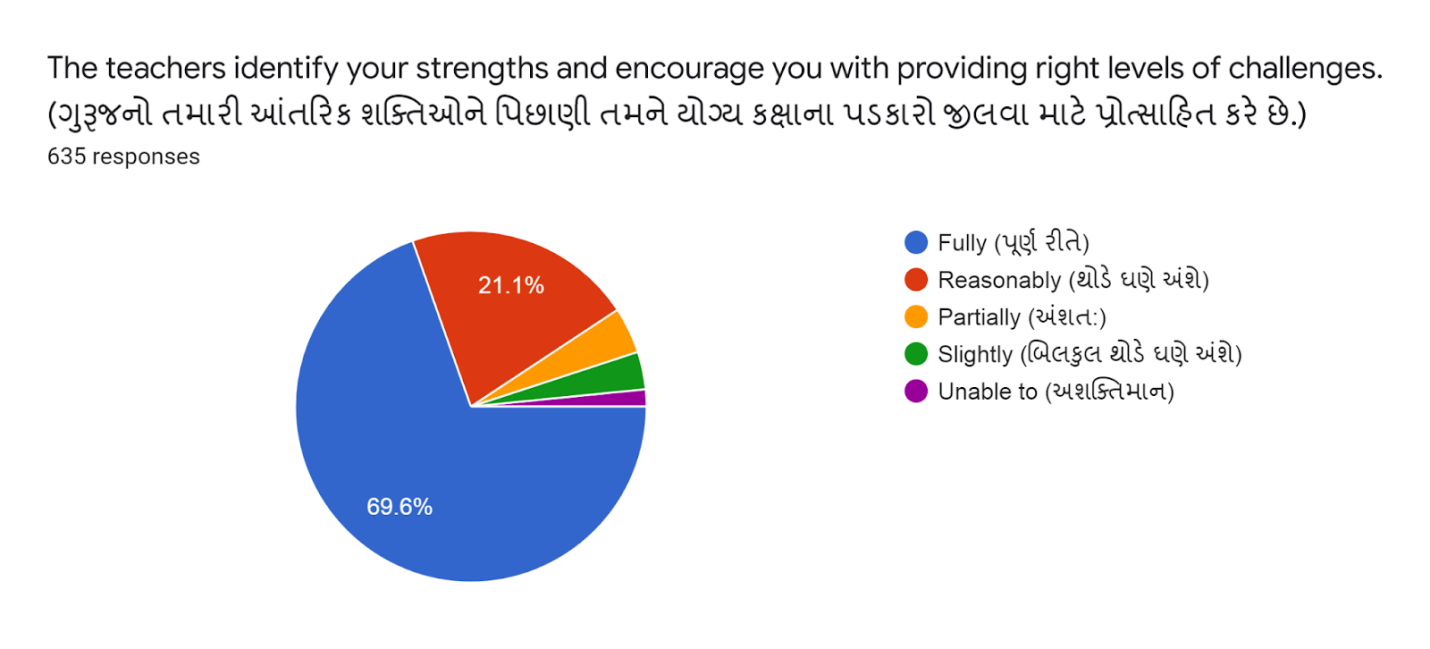
19. 88% students are of the opinion that the teachers are capable enough to identify their weaknesses and help them to overcome them as well. The teachers make a SWOT analysis keeping in mind the feedback received from them and guide them accordingly.
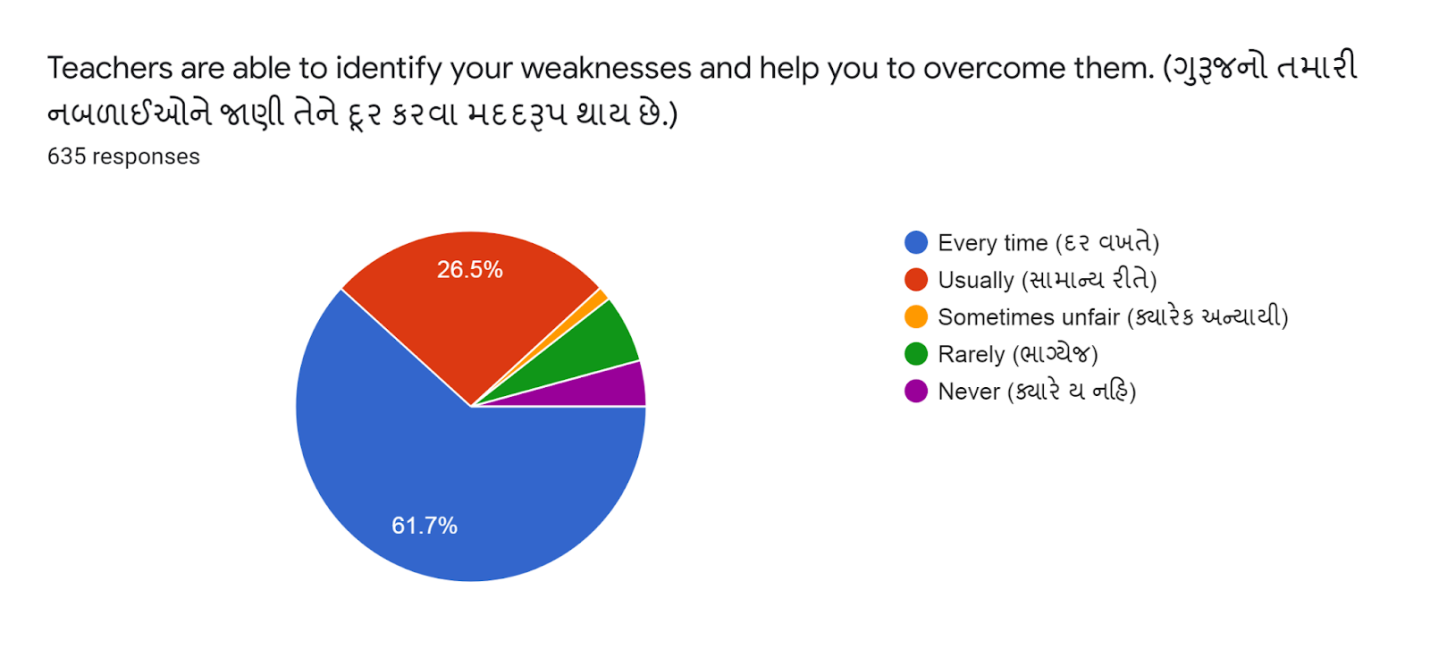
20. Most of the students (90%) have responded that the institution makes efforts to engage students in monitoring, reviewing and improving quality of the teaching learning process continuously.
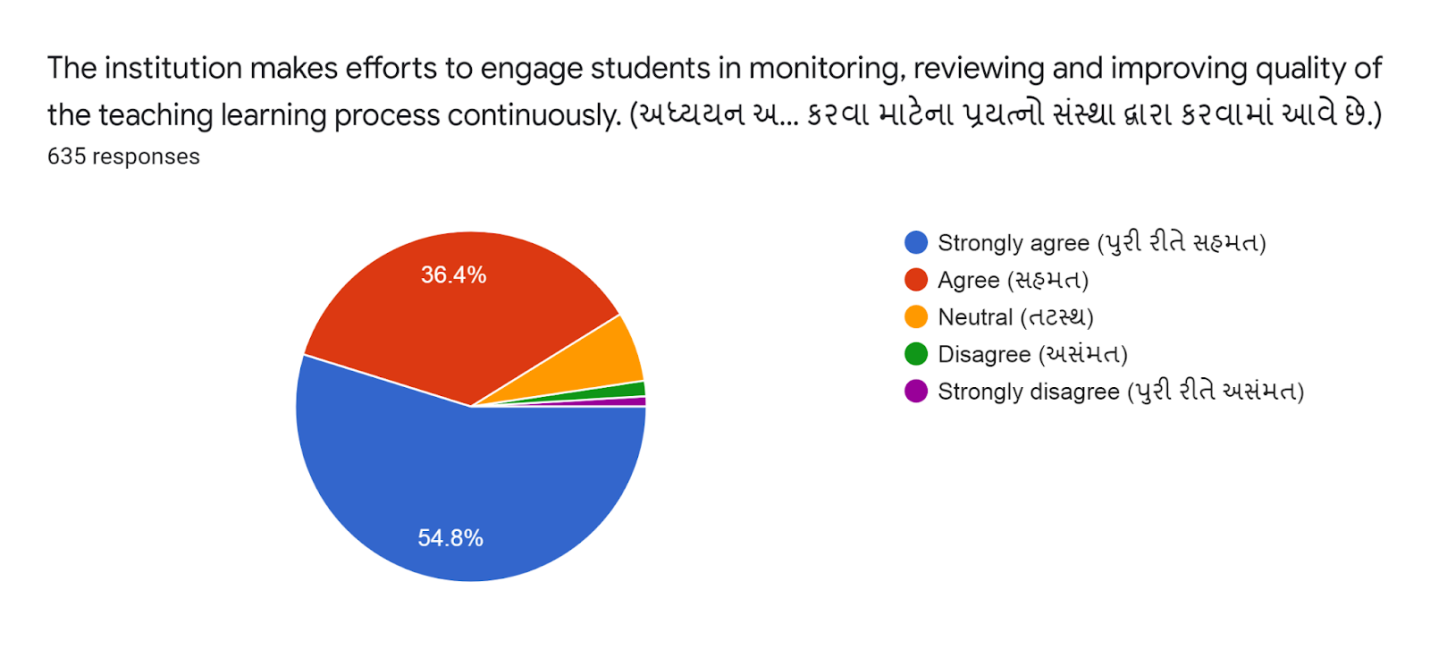
21. 87% students have opined that they are kept at the centre so far curricular, co-curricular and extra-curricular activities of the college are concerned. In the process of participative management, much emphasis is laid on experiential learning, anticipative learning and problem-solving methodologies in the college.
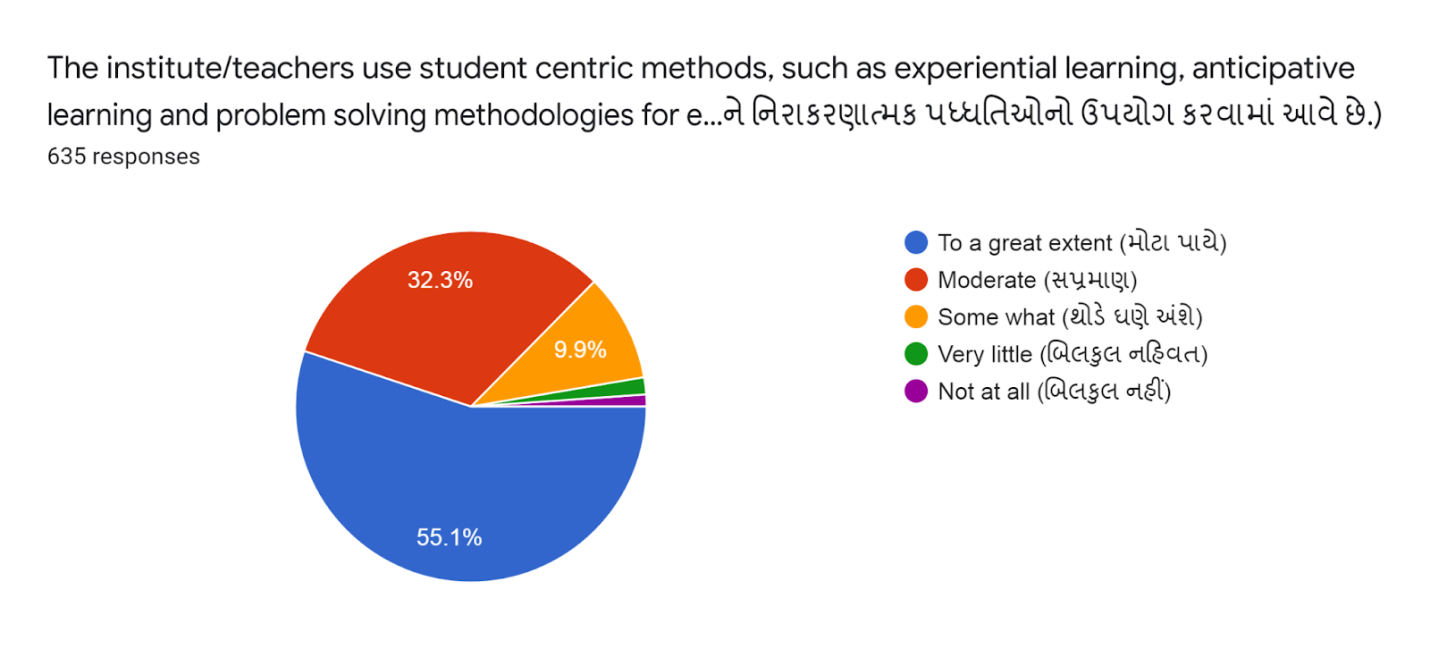
22. According to 91% of students all sorts of attempts are made by the college to motivate the students to take part in all activities performed by the college. Teachers do motivate the students to participate in extra-curricular activities of the college.
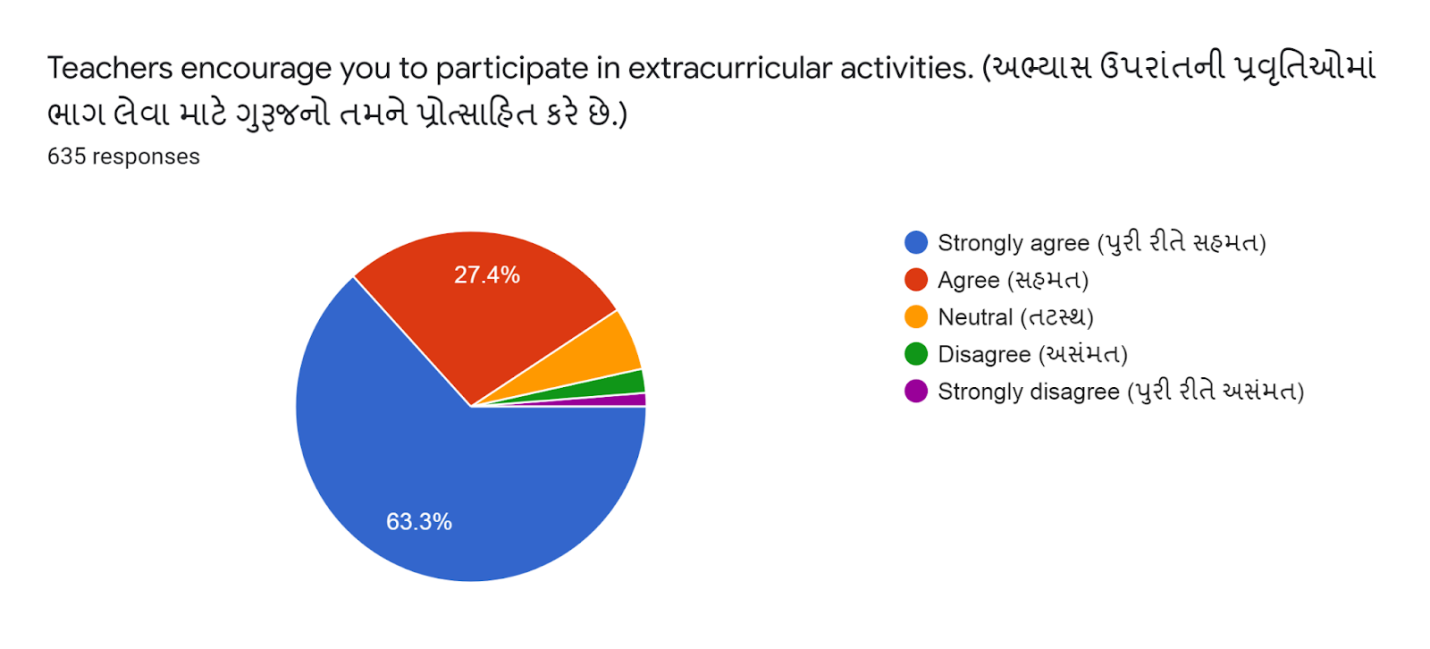
23. 90% of students believe that great efforts are made by the college to inculcate soft skills, life skills and employ ability skills among the students.

24. Some students have opined that above 86% teachers use ICT tools such as LCD projector, Multimedia etc. while teaching.
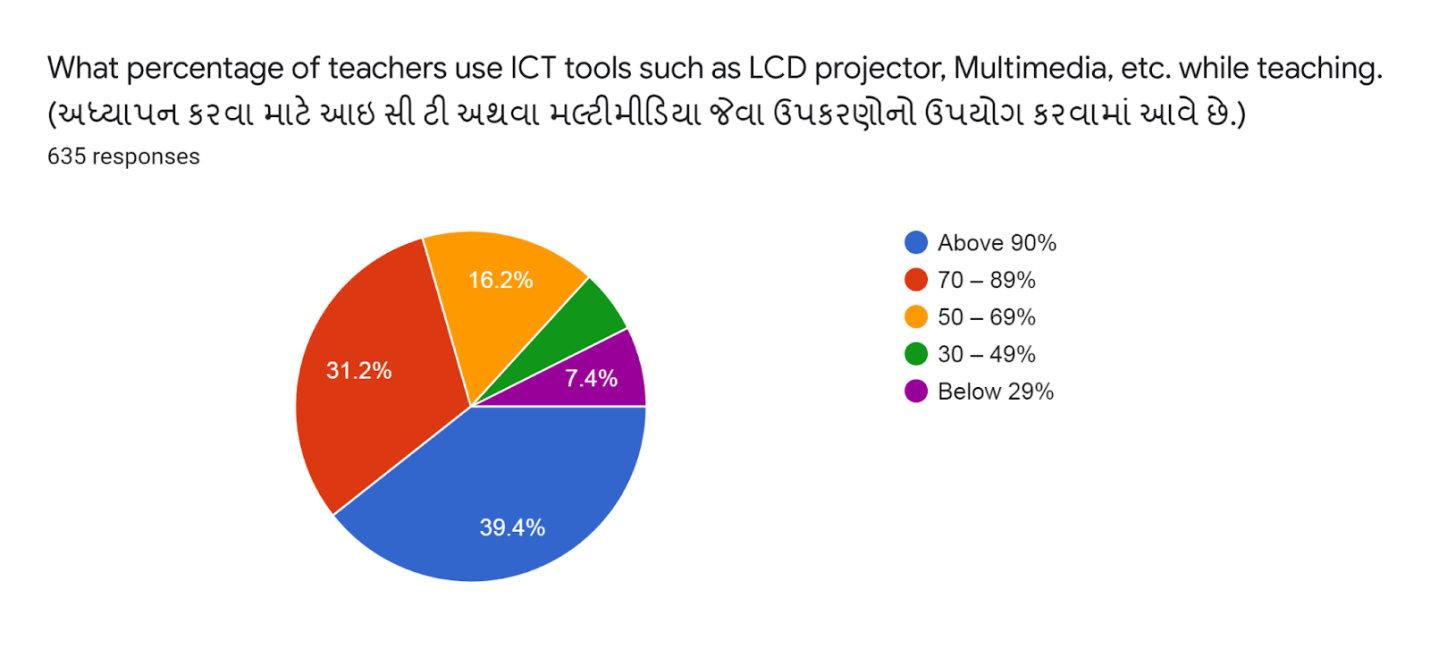
25. 90% students agree strongly that the overall quality of teaching-learning process of the institute is good.
